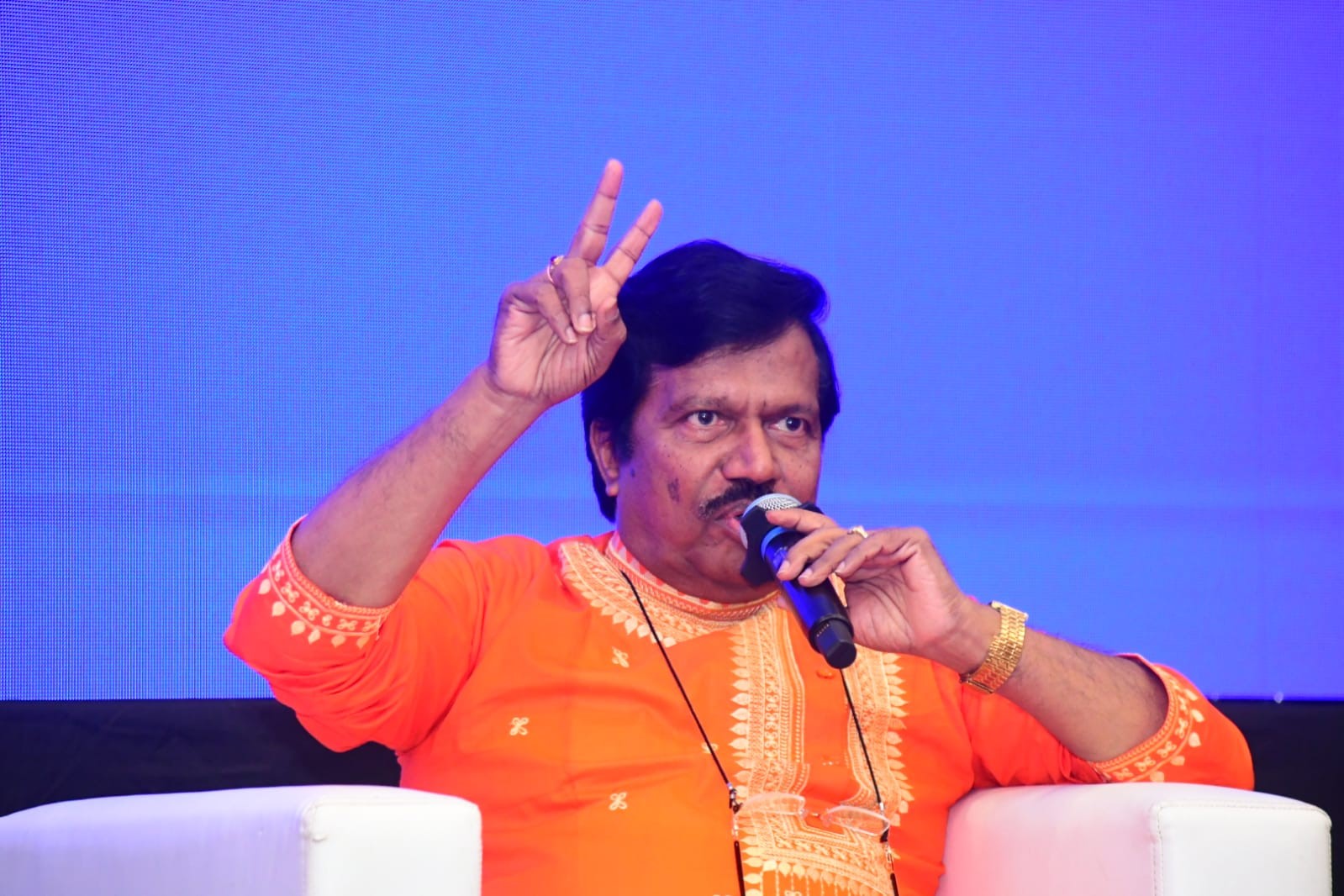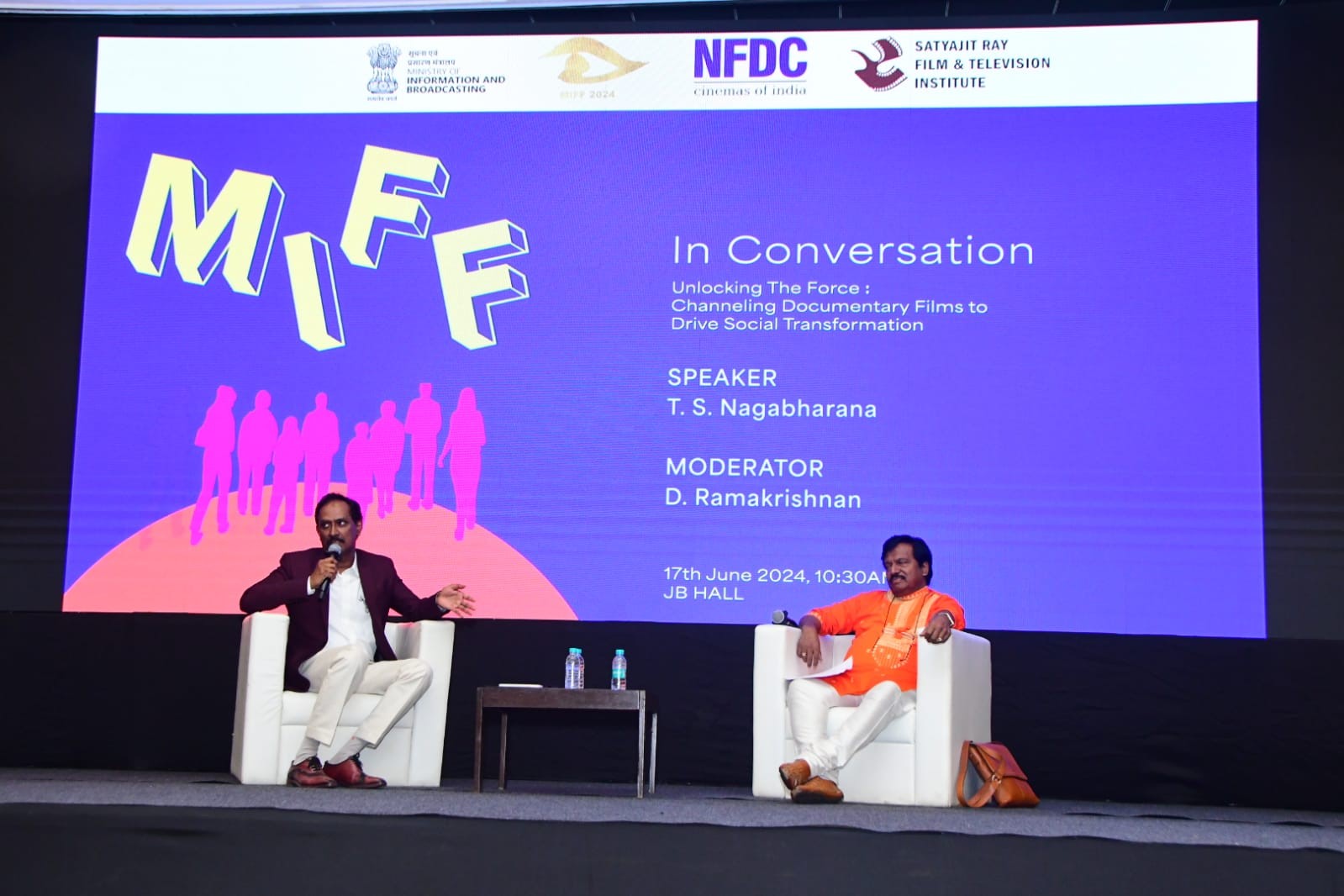Ministry of Information & Broadcasting
In-Conversation Session at 18th MIFF explores potential of documentaries to catalyze social transformation
Filmmakers responsible not just towards nation but entire humanity: Veteran Kannada Film Director Dr. T. S. Nagabharana
Both feature films and documentaries reflect social realism: Dr. T. S. Nagabharana
Posted On:
17 JUN 2024 4:02PM by PIB Mumbai
Mumbai, 17 June 2024
The 18th Mumbai International Film Festival (MIFF-2024) today featured an engaging panel discussion on the topic “Unlocking the Force: Using Documentary Films to Promote Social Transformation,” featuring Veteran Kannada Film Director, actor, and producer Dr. T. S. Nagabharana. The session which explored the immense potential of documentaries to catalyze social transformation centered on the power of documentaries to illuminate pressing issues, inspire action, and drive significant societal change. Shri D. Ramakrishnan, General Manager, National Film Development Corporation (NFDC) moderated the discussion.
Also a renowned documentary filmmaker, Dr. T. S. Nagabharana highlighted the responsibility of cinema as a powerful medium. He pointed out that modern cinema often finds itself in a "No-Man’s land," where anyone with a mobile camera can make a film. However, he stressed the importance of "Cinema in Education and Education in Cinema" to impart the discipline necessary for a film's success.

(In Photo: Dr. T. S. Nagabharana, Kannada Film Director, actor, and producer participating in In-Conversation Session at the 18th MIFF)
According to the prolific filmmaker, both feature films and documentaries reflect social realism and are intrinsically linked to society. He emphasized the necessity for filmmakers to stay updated on current social issues and to strive for social relevance in their work. “Documentary is the artistic tool to social transformation. It is not easy for a filmmaker to go after truth. Truth may not always be visible and is often elusive,” he remarked.
The seven time National award winner also underscored the need for a proper support system for independent filmmaking and warned against manipulating facts in documentaries. He stated, “If you recreate fact, then it is no longer a fact. It is manipulation.” He also called for documentary filmmakers to possess a unique visual literacy and an aesthetic sense to effectively convey their individual perspectives.
Acknowledging the challenges faced by society in accepting the truths presented by filmmakers, Dr. T. S. Nagabharana advocated for inducing change through honest filmmaking. He cautioned against agenda-driven filmmaking, which he believed dilutes authenticity and fosters fake narratives. “Visual language is a different approach, almost like a poetic language. Today’s visual language must derive itself, intertwining poetics and politics to capture the real truth ,” he observed.
Dr. T. S. Nagabharana also emphasized the responsibility of filmmakers not just to the nation, but to humanity as a whole. Clarity of purpose in filmmaking, he asserted, ensures that noble intentions are conveyed, avoiding ambiguity and misleading narratives. He further added that scripting constraints of the past, where documentaries were confined to 10-minute durations, are now alleviated by various modern platforms that offer extended time for storytelling.

(In Photo: Shri D. Ramakrishnan, General Manager, National Film Development Corporation (NFDC) moderating the session)
Discussing emerging technologies, the acclaimed filmmaker highlighted the new phase of visual media, including the use of artificial intelligence. He stressed the importance of purposeful technology integration in filmmaking to effect social change and expressed hope that these advancements will create a new visual language to aid the next generation in expressing their ideas. “For growing in a multidimensional way, one must be multiskilled,” he remarked.
Shri D. Ramakrishnan, General Manager of NFDC, echoed these sentiments, accentuating the crucial role documentaries play in addressing societal issues such as caste discrimination, gender inequality, and environmental degradation. He noted that documentaries have the power to highlight issues, evoke sympathy, and inspire action.
* * *
PIB Team MIFF | Gautam/ Bibin/ Darshana | 22
Follow us on social media: @PIBMumbai
@PIBMumbai  /PIBMumbai
/PIBMumbai  /pibmumbai
/pibmumbai  pibmumbai[at]gmail[dot]com
pibmumbai[at]gmail[dot]com  /PIBMumbai
/PIBMumbai  /pibmumbai
/pibmumbai
(Release ID: 2025901)
Visitor Counter : 1109